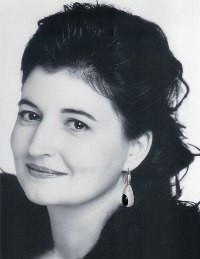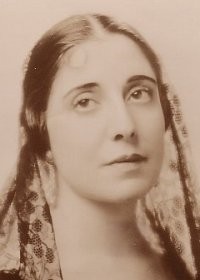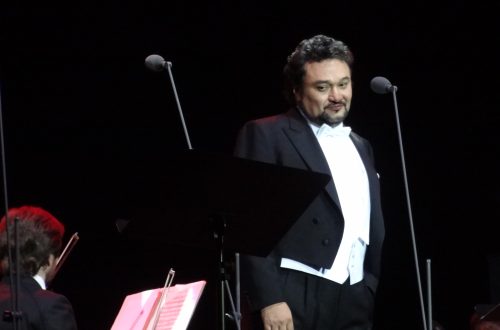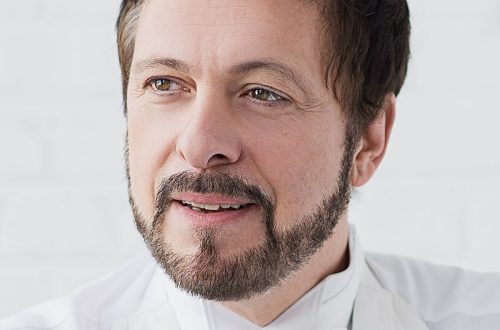
Dimitra Theodossiou |
Dimitra Theodossiou

Greek by father and German by mother, soprano Dimitra Theodossiou is today one of the most highly regarded sopranos by the public and critics. She made her debut in 1995 in La Traviata at the Megaron Theater in Athens. An excellent performer of the music of Verdi, Donizetti and Bellini, Teodossiu showed her talent with particular brilliance in the year of the Verdi celebrations. Past seasons were rich in creative successes: Attila and Stiffelio in Trieste, La Traviata in Helsinki and Troubadour in Montecarlo. Another Troubadour, this time led by Maestro Riccardo Muti, is her debut at La Scala. Personal success in the same opera at the most magnificent and at the same time difficult outdoor venue – the Arena di Verona. Rino Alessi is talking to Dimitra Theodossiou.
It seems that “Troubadour” is destined to play a special role in your destiny…
When I was six years old, my father, a passionate opera lover, took me to the theater for the first time in my life. At the end of the performance, I told him: when I grow up, I will be Leonora. The meeting with the opera was like a thunderclap, and music became almost an obsession for me. I visited the theater three times a week. There were no musicians in my family, although my grandmother dreamed of devoting herself to music and singing. The war prevented the realization of her dream. My father was thinking about a career as a conductor, but you had to work, and music didn’t seem like a reliable source of income.
Your connection to Verdi’s music becomes inseparable…
The operas of the young Verdi are exactly the repertoire in which I feel most at ease. In Verdi women I like courage, freshness, fire. I recognize myself in their characters, I also quickly react to the situation, join the fight if necessary … And then, the heroines of the young Verdi, like the heroines of Bellini and Donizetti, are romantic women, and they require a dramatically expressive vocal style and at the same time great mobility of the voice .
Do you believe in specialization?
Yes, I believe, without any doubts and discussions. I studied in Germany, in Munich. My teacher was Birgit Nickl, with whom I still study. I never even thought about the possibility of becoming a full-time soloist of one of the German theaters, where everyone sings every evening. Such experiences can lead to loss of voice. I preferred to start with significant roles in more or less significant theaters. I have been singing for seven years now and my career is developing naturally: I find it right.
Why did you choose to study in Germany?
Because I’m German on my mother’s side. I was twenty years old when I came to Munich and started studying accounting and business economics. After five years, when I was already working and supporting myself, I decided to quit everything and devote myself to singing. I attended specialization courses at the Munich School of Singing at the Munich Opera House under the direction of Josef Metternich. Then I studied at the conservatory in the same Munich, where I sang my first parts in the opera studio. In 1993, I received a scholarship from the estate of Maria Callas in Athens, which gave me the opportunity to make my debut in La Traviata at the Megaron Theater some time later. I was twenty nine years old. Immediately after La Traviata, I sang in Donizetti’s Anne Boleyn at the National Opera House in Kassel.
Great start, nothing to say. La Traviata, Anne Boleyn, Maria Callas Scholarship. You are Greek. I will say a banal thing, but how many times have you heard: here is the new Callas?
Of course, I was told this. Because I sang not only in La Traviata and Anne Boleyn, but also in Norma. I didn’t pay attention to it. Maria Callas is my idol. My work is guided by her example, but I absolutely do not want to imitate her. Besides, I don’t think it’s possible. I am proud of my Greek origin, and the fact that at the beginning of my career I sang in two operas that are associated with the name Callas. I can only say that they brought me good luck.
What about vocal competitions?
There were also competitions, and it was a very useful experience: Belvedere in Vienna, Viotti in Vercelli, Giuseppe Di Stefano in Trapani, Operalia directed by Placido Domingo. I have always been among the first, if not the first. It was thanks to one of the competitions that I made my debut as Donna Anna in Mozart’s Don Giovanni, my third opera, in which Ruggero Raimondi was a partner.
Let’s go back to Verdi. Are you thinking of expanding your repertoire in the near future?
Oh sure. But not all Verdi operas suit my voice, especially in its current state. I have already been offered to perform in Aida, but it would be very dangerous for me to sing in this opera: it requires a vocal maturity that I have not yet reached. The same can be said about the Masquerade Ball and The Force of Destiny. I love all these operas, and would like to sing in them in the future, but now I don’t even think about touching them. With my teacher, I have prepared The Two Foscari, Joan of Arc and The Robbers, in which I made my debut last year at the Teatro Massimo in Palermo. In Don Carlos I sang at the San Carlo in Naples. Let’s say that at the moment the most dramatic character in my repertoire is Odabella in Attila. It is also a character that marked an important milestone in my career.
So you rule out the possibility of your appearance in two very interesting and dramatic operas by the young Verdi, Nabucco and Macbeth?
No, I don’t rule it out. Nabucco is very interesting to me, but I haven’t been offered to sing in it yet. As for Lady Macbeth, she was offered to me, and I was very drawn to sing this part, because I think that this heroine is endowed with such energy that she willy-nilly must be interpreted while you are young and your voice is fresh. However, many advised me to postpone my meeting with Lady Macbeth. I said to myself: Verdi wanted a singer with an ugly voice to sing the lady, I’ll wait until my voice becomes ugly.
If we exclude Liu in “Turandot”, you never sang in the works of the twentieth century. Are you not seduced by such significant characters as Tosca or Salome?
No, Salome is a character that repels me. My favorite heroines are Donizetti’s Lucia and Anne Boleyn. I like their passionate feelings, their madness. In the society we live in, it is impossible to express feelings the way we want to, and for the singer, opera becomes a form of therapy. And then, if I’m interpreting a character, I have to be XNUMX% sure. They tell me that in twenty years I will be able to sing in Wagner’s operas. Who knows? I haven’t made any plans for this repertoire yet.
Interview with Dimitra Theodossiou published in l’opera magazine Translation from Italian by Irina Sorokina, operanews.ru





